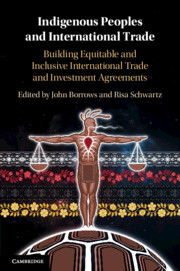 Indigenous Peoples and International Trade
Indigenous Peoples and International Trade Book contents
- Indigenous Peoples and International Trade
- Indigenous Peoples and International Trade
- Copyright page
- Contents
- Contributors
- Foreword
- Acknowledgements
- About the Cover Art
- About the Artist
- Introduction
- Part I Indigenous Peoples and International Trade and Investment
- 1 Indigenous Diversities in International Investment and Trade
- 2 Indigenous Historic Trade in the Western Hemisphere
- 3 Indigenous Peoples of Mexico at the Crossroads: The Human Cost of Continental Trade
- 4 Neocolonialism and the Tension between International Investment Law and Indigenous Peoples: The Latin American Experience
- 5 How the WTO Constructed Inuit and Indigenous Identity in EC-Seal Products
- Part II Building a More Equitable and Inclusive Free Trade Agreement
- Index
4 - Neocolonialism and the Tension between International Investment Law and Indigenous Peoples: The Latin American Experience
from Part I - Indigenous Peoples and International Trade and Investment
Published online by Cambridge University Press: 11 June 2020
- Indigenous Peoples and International Trade
- Indigenous Peoples and International Trade
- Copyright page
- Contents
- Contributors
- Foreword
- Acknowledgements
- About the Cover Art
- About the Artist
- Introduction
- Part I Indigenous Peoples and International Trade and Investment
- 1 Indigenous Diversities in International Investment and Trade
- 2 Indigenous Historic Trade in the Western Hemisphere
- 3 Indigenous Peoples of Mexico at the Crossroads: The Human Cost of Continental Trade
- 4 Neocolonialism and the Tension between International Investment Law and Indigenous Peoples: The Latin American Experience
- 5 How the WTO Constructed Inuit and Indigenous Identity in EC-Seal Products
- Part II Building a More Equitable and Inclusive Free Trade Agreement
- Index
Summary
Chapter 4 looks at how Latin America has experienced both the negative effects of the international investment law system and tensions when trying to protect Indigenous peoples’ rights while simultaneously trying to attract foreign investment. Enrique Prieto-Ríos and Daniel Rivas-Ramírez present some prominent investment arbitration cases involving Latin American countries and the rights of Indigenous peoples. They conclude that Indigenous peoples in Latin America are invisible to investment arbitration tribunals because international investment arbitration is a self-contained system that does not look beyond international economic law to Indigenous rights or, more generally, human rights. Current negotiations among Canada, New Zealand and the Pacific Alliance offer an opportunity to consider including a chapter for Indigenous people. The addition of New Zealand and Canada as associate members means that they will have to address the rights of Indigenous peoples in some manner for domestic political reasons.
Keywords
- Type
- Chapter
- Information
- Indigenous Peoples and International TradeBuilding Equitable and Inclusive International Trade and Investment Agreements, pp. 85 - 108Publisher: Cambridge University PressPrint publication year: 2020


